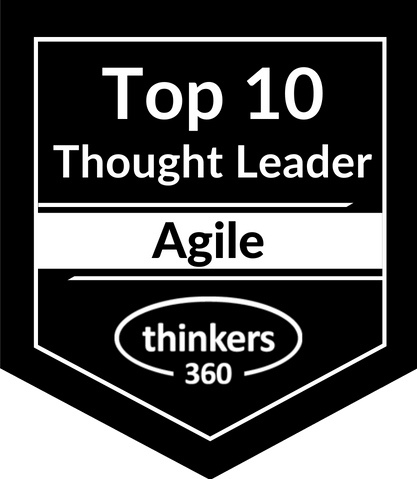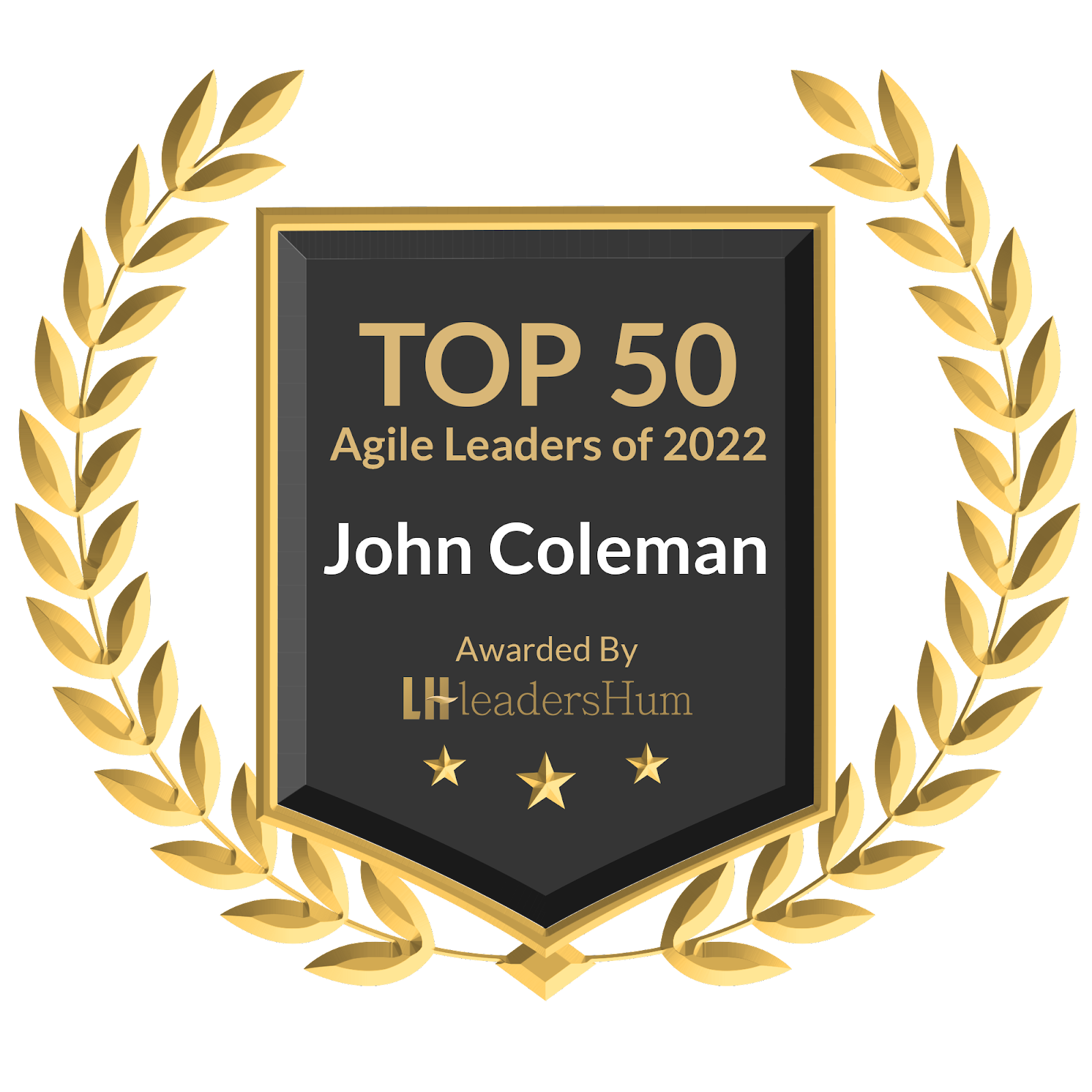Professional Scrum with User Experience
Live Virtual Class, February 26-28, 2025
Class Overview
Professional Scrum with User Experience
Unifying the Team to Deliver Value Together /PSU © Scrum.org All Rights Reserved Professional Scrum with User Experience™ (PSU) is a hands-on, activity-based course where students experience how Scrum and User Experience (UX) align and integrate to create cross-functional teams that connect more closely with end users and customers, ultimately delivering more value and improving outcomes. By working together in a dual-track agile process, members of the Scrum Team can work more effectively to balance discovery work and delivery work. The course also includes a free attempt at the globally recognized Professional Scrum with User Experience I certification assessment (PSU I).
What John Coleman's Students Say
* When offered in person, this course is generally delivered over two consecutive days. When offered as a Live Virtual Class, the course may be broken up into more, shorter days, sometimes consecutive, sometimes one week apart.
Course Overview

In this 14-16-hour class, students will leverage an ongoing case study to apply techniques learned throughout the class and prepare to take what they learn back to their workplace. This course is designed for Product Owners and Scrum Masters to enable them to better incorporate design, research, and learning into their Scrum process.
Lean UX techniques focus the team toward customer-centric design and discovery. Scrum focuses the team on rapid delivery and customer feedback. By bringing together Lean UX and Scrum, teams learn how to drive the design together with delivery in short, iterative cycles to assess what works best for the business and the user.
Leveraging Lean UX techniques, the course takes core design and research activities and illustrates how they come together with development and delivery. Attendees explore how these activities fit into a dual-track agile process (Design and Development) where cross-functional teams can work together to explore, experiment, and deliver value-based outcomes.
This course was created with Jeff Gothelf and Joshua Seiden, the authors of the book Lean UX, leveraging their expertise and knowledge. The goal of working together is to help students learn the truth about many of the myths about combining design and development activities and how to overcome the challenges that come with this integrated team approach.
View the different Focus Areas covered within this class and others.
Who Should Attend
Scrum Masters and Product Owners will learn how to integrate the UX specialty with what they already know about the power of self-organizing cross-functional teams. This will enable them to help Developers learn about the customer, plan learning/discovery/design work, and still deliver a “Done” increment each Sprint.
In addition, Scrum Masters will learn how to incorporate product discovery techniques into Sprints and how to balance the product discovery work with the product delivery work, while Product Owners will learn product discovery techniques that User Experience Designers use to better understand the user's needs.
- UX Professionals struggling to integrate on a Scrum Team will learn how to work more effectively inside Scrum, managing work in Sprints and visualizing it in the Product Backlog.
- People who have learned about Lean UX and want to learn how to integrate those concepts into Professional Scrum working together in a unified Scrum Team.
Course Learning Objectives
- Gain a common understanding of what is meant by Professional Scrum
- Dispel many myths about User Experience and its relationship to Agile and Scrum
- Experience how the UX mindset and the Scrum framework complement, align and integrate
- Learn the advantages of thinking of work as problems to solve and the Business Problem Statement’s role in this
- Understand how the Scrum Team can connect more closely with end users and customers
- Understand how “easily” and “quickly” we can do product development and include UX
- Learn the advantages of thinking of work as problems to solve and how Business Problem Statements can frame the discussion
- Learn common patterns for employing UX practices within a Sprint and within a cross-functional team that includes UX Professionals
- Learn how to plan and balance both discovery and delivery work
- Leave with some UX techniques that can be accomplished within the Scrum Team
- Understand how anyone on the Scrum Team can support UX practices in support of the product
- Focus on outcomes and impacts over outputs
- Embrace the need to release and use measurements to validate outcomes
- Realize the importance of incorporating UX work as part of the Product Backlog
- Learn the value of testing hypotheses with experiments
- Understand how to design experiments to be as low-cost, low-risk as possible and how to make them “ride the Truth Curve” as you increase investment
Professional Scrum Certification
All participants completing the Professional Scrum with User Experience course will receive a password to attempt the Professional Scrum with User Experience I (PSU I) certification assessment. PSU class participants who attempt the PSU I assessment within 14 days of the class and do not score at least 85% will be granted a second attempt at no additional cost.
Why Scrum.org
Scrum.org provides the highest-quality Scrum training, training materials, and certified Professional Scrum Trainers (PSTs) to teach it. Our training materials are created and maintained by Scrum co-creator Ken Schwaber, Scrum.org, and the PST community members who teach the courses, helping to ensure that they are in tune with what’s happening in organizations and always up-to-date with the latest practices.
Professional Scrum Trainers bring their own style and experience to the courses, but they use the same materials, so students learn from the same content regardless of who teaches the course or where it is taught around the world. Read more about the differences.
PMI PDU Credits
Students of Scrum.org courses can claim Project Management Institute (PMI) PDU credit: 14 PDUs after attending a 14-16-hour* Professional Scrum with User Experience workshop. Please note that PMI PDUs are earned for course attendance, not for passing a Scrum.org assessment. Students can claim PDUs under PMI's "Education courses provided by other third-party providers” category. You can claim your PDUs online at https://ccrs.pmi.org.
Invoicing
To request a manual invoice, email info@orderlydisruption.com with the subject "manual invoice."
Class Details
Taught By
Language
English
Delivery Method
Date
Class Format
TraditionalPartner
Orderly Disruption LimitedRegistration & Price
Local sales tax or VAT or GST determination will be applied after the billing address is entered. If you disagree with the currency exchange or tax treatment, please email info@orderlydisruption.com.
Registration for this class has closed
More Information
Profile of the trainer



- Active agility chef, executive agility guide, and product manager
- #2 Agile Thinkers360
- Leadershum Top 50 Agile Leaders 2022
- Flight Levels Coach, ProKanban Professional Kanban Trainer, Scrum.org Professional Scrum Trainer including Nexus, LeSS Friendly Scrum Trainer
- Creator of Kanplexity™ & Xagility™
- Co-author of Kanban Guide
- Host of Xagility™ & Agility Island podcasts
- See linktr.ee/johncolemanxagility for social and podcast links
- See https://linkpop.com/orderlydisruption for John's other classes
- InfoQ article June 2022 - why you might need an island of agility
- InfoQ article August 2022 - talking about sizing & forecasting in Scrum
Review & Ratings
Reviews & Ratings for all of John Coleman's workshops are available on:
- Google - http://bit.ly/GoogleJohnC
- TrustPilot - https://www.trustpilot.com/review/www.ace.works
- Vocal References - http://bit.ly/VocalRJohnC
It's not just about Reviews & Ratings
Reviews & ratings are limited by nature. John needs to understand if the learning made a real difference back in the office. So, John likes to check in 12-18 months later. He sees a pattern of improvement and regularly gets pleasant vibes from successful agility inspired by ideas from the training. For example, see this experience report.
More proof he knows what he's talking about and has done what he talks about
John's Scrum+Kanban Nexus+ case studies can be found (international payments company, European bank) at https://www.valueglide.com/blog/nexus-nexus-and-scrum.org-certifications.
John is grateful to be part of Marshall Goldsmith's #payitforward campaign and, in so doing, offers free coaching/mentoring/co-training to a selection of potential agility chefs. Marshall Goldsmith taught John in Salt Lake City in February 2018. All of John's workshops #payitforward Marshall Goldsmith content, including Marshall's advice to John himself.
Client list
John's client list (directly or indirectly) includes Japanese Tobacco International, TUI, Lilbit, digital2DNA, Shell, BP, Barclaycard, Vocalink Mastercard, Centrica, the Musgrave Group, RR Donnelley, DELL, Nordic Aviation Services, 84.51, Intralinks, PaySafe, Vodafone, Ericsson, NASA, Sky and many more.
Venue
Assessment Readiness Call(s)
Assessment preparation tends not to be covered in the workshop. The workshop focuses on attendees getting ready to apply new skills back at work immediately after the workshop. There is an expectation that attendees will attend some free post-workshop Zoom calls and watch recordings of their own group (or previous groups) doing tough practice tests, sometimes including John Coleman's own practice tests, which address the same learning outcomes, albeit from a different angle. John has an expectation that attendees will attend the calls, as assessment preparation does not scale on a 1:1 basis. Signing up for this workshop is effectively signing up to attend these calls.
Sometimes, John Coleman will have a co-trainer, someone who is already qualified or who is building up experience. Please let John Coleman know in advance if you need him to bring an assistant trainer who speaks your language via john@orderlydisruption.com; economics will hopefully be in our favor to allow that if there is enough demand.
If Live Virtual, rules to follow:
- Each segment is 60-75 minutes long with 15-30-minute breaks.
- No recording of the workshop to improve openness. The workshop size is limited to 20 attendees.
- Workshop attendees will use Zoom/Teams, Mural, Miro, and John's physical flipcharts.
- Cameras on
- Mics on - let's avoid delayed interventions
- Be on time for every segment
- No meetings/phone calls/emails during the active segments
- Be self-aware and conscious of the needs of others to have their say
Payment, fees & cancellation
- Payment in advance is required; there are no exceptions. For example, all documentation requirements for invoice payment by the training date must be declared at the outset.
- You may cancel up to the specified online ticketing deadline, and if so, depending on the payment engine/approach, the refund could have deductions for bank transfer fees.
- You may postpone your ticket with a minimum of three business days' notice. Otherwise, your lack of attendance at the booked date will be treated as a cancellation with zero refund (due to planning and venue costs for class numbers). Best efforts will be made to fit you into a later workshop. A postponement rescinds your notice period for a refund.
- Electronic manuals and Scrum.org assessment fees are included. Physical manuals are not provided.
Data protection, data privacy
- Attendees may be asked to optionally consent to receive communications, e.g., follow-up email newsletters.
- The trainer must submit your name and email address to Scrum.org in order to get an assessment code.
- As John is a LeSS-Friendly Scrum Trainer, by signing up for this training, you are submitting your details to LeSS.works, the home of Large Scale Scrum.
- Attendees will be invited to a community for continued learning.
- It's possible that photograph or video permission will be requested in class for follow-up marketing purposes and social media.
- Reviews, testimonials, and feedback for improvement will be requested. Attendees may also be asked to provide feedback to Scrum.org.
- See the privacy statement at orderlydisruption.com.

